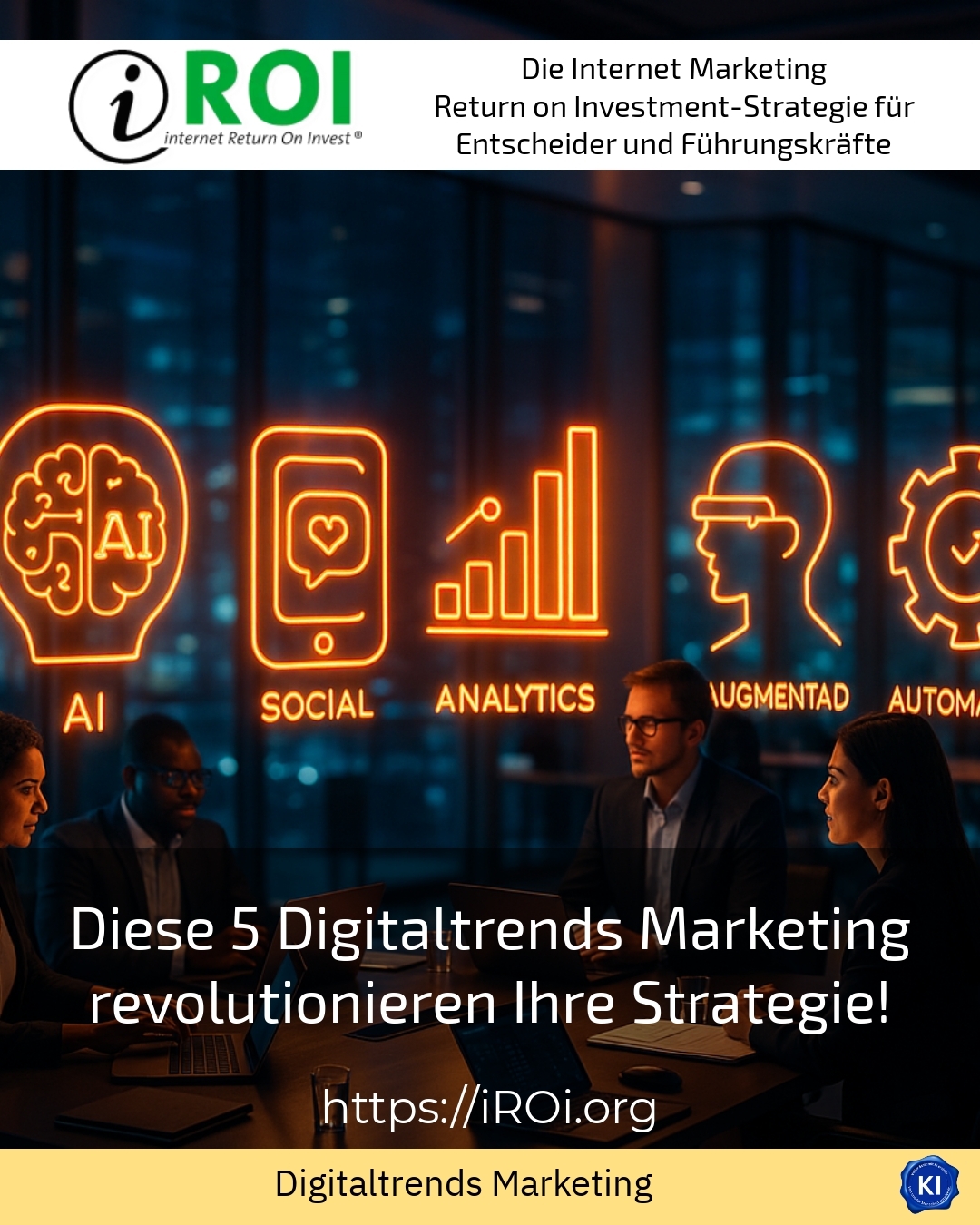The **Digital Trends Marketing** are currently changing the way companies design and implement their marketing strategies. Through the targeted use of new technologies and digital methods, target groups can be reached with pinpoint accuracy and retained in the long term. Especially at a time when traditional advertising channels are losing their impact, these trends offer valuable impetus to accompany and support projects in a contemporary way.
The importance of digital marketing trends for modern companies
Today, companies expect their communication not only to be present, but also to be relevant and authentic. This is precisely where **Digital Trends Marketing** provides support through its versatility and precision. They promote customer-centred interactions, increase brand awareness and enable measurable success. The spectrum ranges from data-driven content marketing to social media and innovative automation solutions.
An example from the consumer electronics industry shows how a manufacturer uses a combined strategy of SEO and topic-focussed social media campaigns to support product launches and gain measurably more attention. The channels are linked in such a way that interested parties are taken directly to the website or shop, actively supporting the purchasing process.
Companies in the fashion sector also use digital trends marketing by making targeted use of influencers and running personalised email campaigns. This allows them to reach their core target groups emotionally and create direct sales incentives at the same time. Sophisticated segmentation ensures optimal targeting and noticeably increases the conversion rate.
Digital trends in marketing: five trend-setting developments
1. artificial intelligence for automated personalisation
AI-supported tools make it possible to precisely evaluate customer data and automatically play out personalised marketing content. For example, a software provider can use intelligent chatbots to answer user questions around the clock and provide suitable product recommendations at the same time. This improves the user experience and relieves the burden on support teams at the same time.
Another practical case is an online retailer that uses automated analysis to recognise purchasing behaviour and sends out targeted discount campaigns, which strengthens customer loyalty and increases sales.
2. social media as a lively brand forum
Platforms such as Instagram, TikTok and LinkedIn are having a massive impact on marketing with their diverse formats. Here, companies often focus on authentic content and interaction.
BEST PRACTICE for a client (name withheld due to NDA agreement): The team supported the implementation of a social media strategy that regularly combined user-generated content and storytelling. The resulting community identified more strongly with the brand and ensured a significant increase in sales around the campaign.
Another example is a start-up in the lifestyle segment that picks up on trends via TikTok and uses viral challenges to increase reach and engagement.
3. content marketing as a key instrument
High-quality content supports visibility in search engines and attracts interested parties in the long term. An agency can contribute to industry expertise through regular specialist articles and how-to videos.
BEST PRACTICE at a customer (name concealed due to NDA contract): A blog with practical guidelines was set up as part of a project. Search engine optimisation and targeted links resulted in a loyal readership, which is often reflected in rosy sales figures.
In the software industry, companies not only establish leads, but also a level of trust that positively accompanies the purchase decision.
4. multichannel strategies for a coherent approach
The combination of different channels creates synergies. For example, a retailer can combine targeted advertising via search engines with social ads and simultaneously drive further impulses via newsletters. This creates a coherent brand experience.
BEST PRACTICE with a customer (name withheld due to NDA agreement): The development of a cross-channel campaign led to an increase in sales by linking remarketing with email activities and social content.
In the travel industry, too, this makes it possible to accompany potential customers digitally from inspiration to finalising a booking.
5. data-driven optimisation of marketing measures
Data forms the foundation for effective digital marketing. Companies use analysis tools to constantly monitor and adapt campaigns. Conversion rates, user behaviour and interaction rates, for example, can be quickly evaluated.
An e-commerce company that uses monitoring tools reacts flexibly to trends and dynamically adjusts advertising budgets to maximise returns.
This minimises wastage and addresses customers precisely.
Digitaltrends Marketing as support in iROI coaching
iROI coaching provides companies with practical support, particularly when implementing complex digital projects. It assists with the planning and implementation of campaigns and provides impetus on how digital marketing trends can be used effectively. Many clients report that this support helps them to maintain an overview and apply the right strategies in a focussed manner.
Clients from a wide range of industries, from retail to services to IT, benefit from the customised adaptation of digital measures to their goals and resources. This enables even challenging projects to be mastered efficiently.
My analysis
Today, the use of digital marketing trends is indispensable for companies that want to successfully develop their strategy. The examples presented show that it is not just about individual tools, but about the interplay of different channels and technologies. Through data-based planning, creative content and a targeted approach, companies can reach their target groups more precisely and promote sustainable growth.
iROI coaching offers valuable support that helps to integrate digital marketing trends into projects in a targeted manner. This helps to recognise change as an opportunity and to work with innovative methods.
Further links from the text above:
Digital Marketing Economy: Terms & Examples
What is digital marketing? Definition, types and examples
Digital marketing: definition, measures and practical examples
Digital marketing - definition, strategies & trends - exovia
Ten examples of digital marketing strategies as ...
Digital marketing - definition and examples
For more information and if you have any questions, please contact Contact us or read more blog posts on the topic internet Return on Investment - Marketing here.















